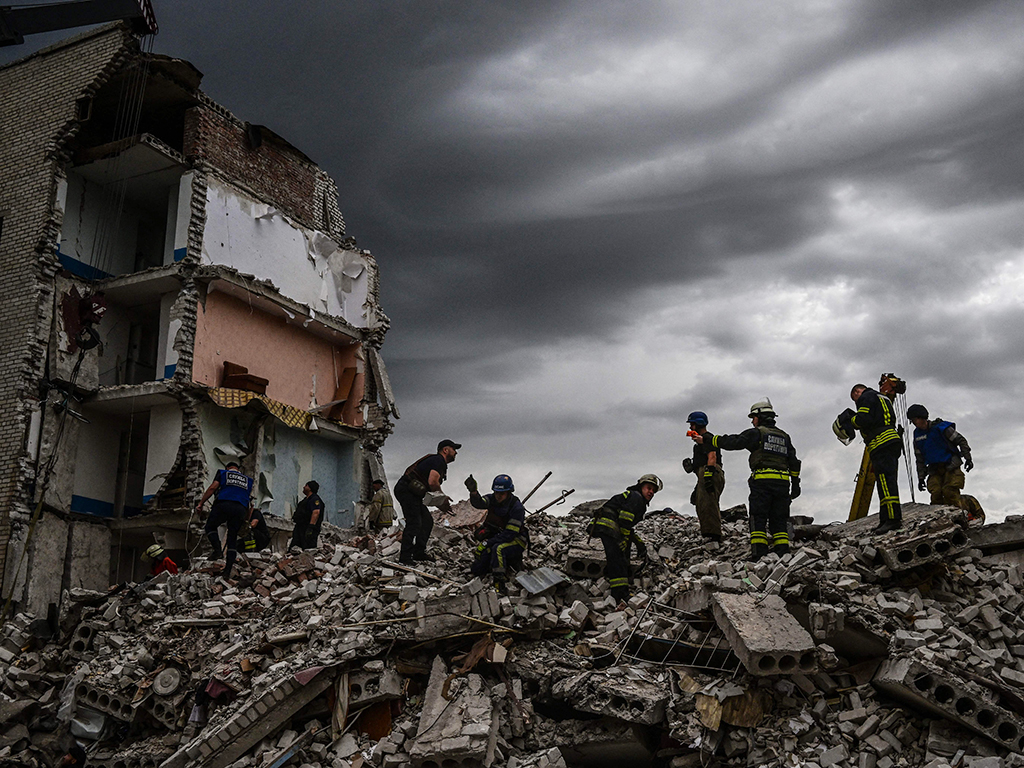
On 11 July the Nord Stream 1 gas pipeline from Russia to Germany closed for its annual ten-day maintenance period. This year, though, it is unclear whether it will reopen. Flows through the pipeline to Europe’s biggest economy were already cut last month by 60 per cent and ministers in Berlin warn that Moscow may now end them entirely, to sow discord in the West and retaliate for its support for Ukraine.
With its heavy manufacturing economy and an energy policy built on Russian gas imports, Germany now faces a grim winter. Its gas storage facilities are 63 per cent full – not enough to get it through the cold season. Officials warn of hot water rationing, blackouts, and mass dormitories for citizens unable to heat their homes. The country could be plunged into recession: the Prognos research institute estimates a worst-case 12.7 per cent drop in GDP. Robert Habeck, the Green Party economy minister, has warned of “a political nightmare scenario” and “the biggest test of Germany’s resilience in a long time”.
It all adds to wider concerns about the country’s economic model. During the contented Merkel years Germany was too slow to adapt to new technology and invest to meet new competitive challenges, and too hasty to switch off nuclear power stations that gave it a degree of low-carbon energy independence. Now, rising energy costs have crashed the mighty German trade surplus; in May it imported more than it exported for the first time in three decades. It may even need a humiliating “energy bailout” from EU neighbours. Hence international headlines such as: “Germany’s economic foundations are collapsing”. Germans themselves are given to exaggerated displays of pessimism even at the best of times; now, a recent commentary in the Handelsblatt newspaper compares the coming months to the so-called Hunger Winter of 1946 “in which tens of thousands of Germans died of cold and malnourishment”.
Time to draw a breath. Germany is indeed facing a difficult period. But the hysteria is both excessive and dangerous.
The 2020s were always going to be a challenging period of transition for the German economic model. Its giant trade surpluses were always unsustainable, indicating not just industrial strength but weak domestic consumption and destabilising imbalances in the eurozone. The country’s climate commitments were always going to require a rapid exit from fossil fuels. It was always going to have to adapt to technological shifts such as the demise of the internal combustion engine. The economic and energy shocks of the Ukraine war only accelerate those trends.
[See also: Driving through Ukraine, I am confronted by the end of the world]
And the country could be much worse prepared to meet them. With the second-lowest debt in the G7, Germany’s government has deep enough pockets to protect its population and economy from the worst of the coming winter. The energy crisis will lessen in the medium term (with new liquefied natural gas (LNG) terminals due for completion in early 2023) and in the long term (given Habeck’s ambitious goal of 80 per cent renewable energy by 2030). German industry is already showing it can adapt: it is on the cusp of overtaking China as the world’s top electric car producer, for example. The crucial pillars of its economic model remain: an industry-friendly training system, high levels of research and development spending, a dense ecosystem of specialised “Mittelstand” export firms, consensus-based government and a competitive exchange rate. As the American economist Tyler Cowen writes, Germany’s wealth rests on “its productivity and human capital, not any pattern of trade surplus or deficit”. He predicts it “will muddle through and manage a major turnaround”.
Yet the turbo-gloom is changing how Germans see the war. For its size and location, the federal republic has already shown disappointingly meagre leadership in supporting Ukraine. Worries about a hard winter appear to be intensifying this tendency. A new poll for the public broadcaster ARD shows support for tough measures against Russia “even if energy prices and living costs rise” dropping by nine points to 57 per cent. Another shows that a plurality of Germans (47 per cent to 41 per cent) now think Ukraine should give up its eastern territories for peace. On 10 July the Bavarian premier Markus Söder, known for his uncanny knack for reading the public mood, ominously told an interviewer: “Help for Ukraine is important, but of course we must first and foremost take care of our population in Germany.”
Such thinking is already reshaping policy. On 9 July Canada succumbed to German entreaties to breach sanctions against Russia by exporting a gas turbine needed for Nord Stream 1. And contrary to the proclamations of a Zeitenwende – turning point – early in the war, Germany’s basic defence budget is due to fall between now and 2026. By overstating the looming energy crisis and understating German resilience, politicians risk contributing to a Germany more likely to pressure Ukraine to make concessions to Vladimir Putin, and one less prepared for a turbulent new age.
Europe’s largest economy can get through a temporary energy crisis. But what about the future crises of a continent where borders can be redrawn by force? Where the US, increasingly consumed by its own internal problems, turns away, and Europe’s governments are incapable of providing their own security? These prospects, not that of turning down radiators, are what should keep Germans and their allies awake at night.
[See also: Angela Merkel’s self-justification on Russia does not add up]
Correction: This article originally described Germany’s debt as “the lowest in the G7”. In fact it is the second-lowest. This has been corrected.
This article appears in the 13 Jul 2022 issue of the New Statesman, The Selfish Giant



